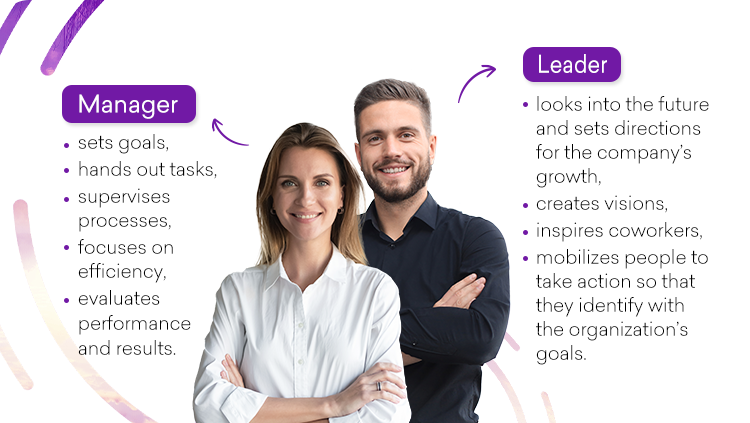Let’s start by highlighting that there’re many approaches, models and theories on what a good leader should be like: focusing on personality traits, skills or mindset. However, most of them are consistent in recognizing that there’s a difference between being a leader and being a manager. Both roles are critical to the operation of the organization. Understanding the difference between the two is key to creating development plans – both for the HR department and the managers themselves.

Generally available development tools
Organizations are increasingly creating job descriptions that include full details of the expected skills, knowledge, and attitudes (so-called ‘competency profiles’). They can serve as the starting point for planning the development of the entire workforce and individual managers.
What tools might come in handy in this process?
- Comprehensive feedback on the quality of work
To have a full picture of how a manager works, thinks and acts, it’s a good idea to perform a 360 assessment, which helps provide feedback on the manager’s performance. Ideally, it should come from the widest possible group, including the manager’s team, associates, superior, and stakeholders. Such a holistic perspective is often very useful as a ‘mirror’ in the manager’s self- assessment. In this way, managers can look closely at how they work and what impact they have on others. In addition, 360 assessment brings to light their strengths and weaknesses. Preferably, it should be carried out regularly, and needed changes should be implemented on an ongoing basis.
- Modern ways of learning
Any gaps in knowledge relating to a particular area can be easily addressed by reading books or other materials on the topic, or participating in dedicated training. A helpful tool here is, for example, Legimi, where you can find over 160,000 e-books and audiobooks, available 24/7. Also recommended are VOD training programs from Youniversity. They take the form of 10-minute videos addressing current topics and industry trends. Both services are available in MultiLife.
- Learning foreign languages
Proficiency in foreign languages, particularly English and German, is very important and, for managers working in multinational companies, even essential. Development-oriented managers should commit to expanding their vocabulary by using platforms such as ESKK. Good foreign language skills expand networking opportunities and give access to reading resources and the most prestigious courses at first-rate universities (such as Cambridge, Harvard or Stanford). They’re completed by just a handful of top-tier managers, so the goal is worth striving for.
- Action simulation
Remember that work is all about accumulating experience! In this case, learning takes place by getting into a variety of simulated scenarios that require different ways of acting and thinking. These can be workshops, programs or development-oriented groups working on daily real-life challenges (action learning). There are plenty of such services available on the market.
The key is to make sure that actions, even small ones, are implemented by managers after workshops in their day-to-day work. Another useful strategy involves scheduling regular meetings with your superior to discuss whether the actions taken are having the desired effect. What could work better than regular feedback? Feedback helps to ensure that the time spent on training will translate into tangible benefits in day-to-day work.
- Deeper insight into yourself
Psychotherapy, mentoring and coaching are among the most all-embracing forms of personal development. They provide an opportunity to gain insights into your thoughts, habits, and beliefs. These, in turn, directly impact the managers’ decisions and actions. Self-awareness gained, for example, during sessions with a psychologist, is incredibly empowering. It gives employees an insight into the internal resources (skills, talents, personality traits, needs or values) they can rely on. It’s not always necessary to look for a mentor outside the organization. Sometimes an insider can be very helpful because they know the specific nature of the company’s operations. However, it’s important to make sure that the in-house mentor is not a person working directly with the manager concerned, especially in a superior-subordinate relationship.
- Industry perspective
A good way to encourage managers to broaden their horizons, think outside the box or look for innovative ideas is to suggest participating in industry meetings and conferences, or unlocking the potential of networking. As a rule, these are opportunities to confront attitudes and beliefs with those of other people, gain completely new perspectives and get an incentive to explore various topics. It’s a good idea to check LinkedIn from time to time. This will keep you up to date with what’s happening in your field. You’re sure to come across events and activities to recommend to your managers.
- Psychometric assessments
Many HR departments have access to various types of assessments which help managers to build up a picture of their personality traits, management style or level of mental resilience. Assessment results – thoroughly discussed with a professional – can be a good stimulus to reflect on working and collaboration styles. And, in the next step, to plan development-oriented actions. If you have no access to such assessments, check out what is currently available on the market in your field of interest, complete the necessary certification or reach out to external experts who can carry it out for you.
- Learning through coaching
Managers may grow into leaders by acting as mentors, buddies or coaches to their less experienced colleagues. Preferably, meetings should be conducted with a clear focus: on listening and asking questions. It’s important to cultivate a sincere interest in other people and give them space to find solutions, rather than handing them on a platter for implementation. Whenever managers stand out with their skills in a particular area, they may be assigned mentees, so that they can grow together in the workplace.
As a rule, HR departments hold workshops preparing for the roles of mentor, buddy or coach in the organization. Such workshops give a basic understanding of the tasks and skills expected in the role. There’re also many courses and training programs on the market in this area that can promote the development of selected managers.
For managerial staff, development is an ongoing process in which appropriate methods and tools are selected depending on the needs. Preferably, managers should regularly discuss their progress with the HR department and take actions to promote their key competencies. Everyone has their own path to realizing their full potential and achieving success. Therefore, employees should be approached individually and the benefits offered should be tailored to the needs of each and every individual. See how you can do this with MultiLife.

